- News
- Reviews
- Bikes
- Accessories
- Accessories - misc
- Computer mounts
- Bags
- Bar ends
- Bike bags & cases
- Bottle cages
- Bottles
- Cameras
- Car racks
- Child seats
- Computers
- Glasses
- GPS units
- Helmets
- Lights - front
- Lights - rear
- Lights - sets
- Locks
- Mirrors
- Mudguards
- Racks
- Pumps & CO2 inflators
- Puncture kits
- Reflectives
- Smart watches
- Stands and racks
- Trailers
- Clothing
- Components
- Bar tape & grips
- Bottom brackets
- Brake & gear cables
- Brake & STI levers
- Brake pads & spares
- Brakes
- Cassettes & freewheels
- Chains
- Chainsets & chainrings
- Derailleurs - front
- Derailleurs - rear
- Forks
- Gear levers & shifters
- Groupsets
- Handlebars & extensions
- Headsets
- Hubs
- Inner tubes
- Pedals
- Quick releases & skewers
- Saddles
- Seatposts
- Stems
- Wheels
- Tyres
- Health, fitness and nutrition
- Tools and workshop
- Miscellaneous
- Tubeless valves
- Buyers Guides
- Features
- Forum
- Recommends
- Podcast
feature
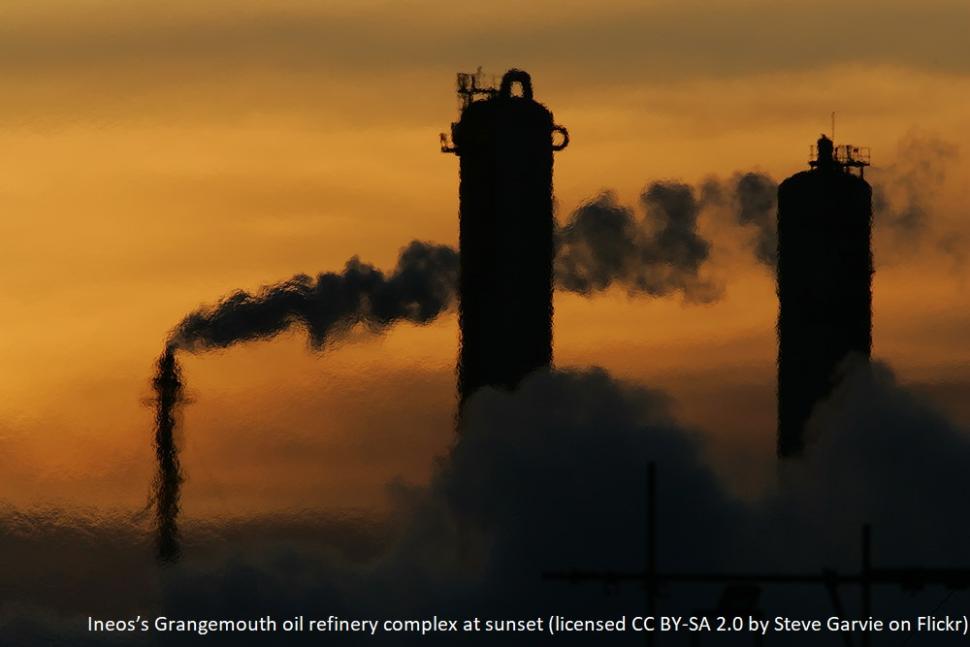 Ineos’s Grangemouth oil refinery complex at sunset (licensed CC BY-SA 2.0 by Steve Garvie on Flickr)
Ineos’s Grangemouth oil refinery complex at sunset (licensed CC BY-SA 2.0 by Steve Garvie on Flickr)Is cycling's 'sportswashing' debate too big to ignore? World Championships protest shines spotlight on less-than-green sponsors
Yesterday’s protest that held up the men’s elite road race at the UCI Cycling World Championships in Scotland is not the first time that environmental campaigners have disrupted a major sporting event in the UK this summer. But unlike recent interventions by Just Stop Oil, yesterday’s direct action by a group called This Is Rigged, specifically referenced team sponsorship by the petrochemical industry as the reason it targeted the event, raising the question of whether what campaign groups term as ‘greenwashing,’ itself part of the wider issue of so-called ‘sportswashing,’ is now too big for the sport to ignore.
2023 world road race championships stopped following protest (Pauline Ballet/SWpix.com)
The incident, which delayed the race for an hour while police removed protesters who had cemented themselves to the road, comes after a protest from the same group last month when activists blocked the gates to the Ineos refinery in Grangemouth on the Firth of Forth, just a few miles away from yesterday’s disruption.
Ineos Grangemouth petrochemical plant (licensed CC BY-SA 2.0 on Wikimedia Commons by Paul McIlroy)
Named as Scotland’s biggest polluter shortly after it entered the sport following its takeover of Team Sky in May 2019, Ineos was targeted by anti-fracking protesters at that month’s Tour de Yorkshire, with the campaign group Friends of the Earth accusing it of greenwashing and calling for a ban on the sponsorship of sport by petrochemical firms.
Despite strong denials of greenwashing by Ineos owner Sir James Ratcliffe and the team’s then principal, Sir Dave Brailsford, who now heads up its entire sporting portfolio including its interests in Formula 1 motorsport, football and sailing, its efforts to establish some form of environmental credentials have hardly been helped by the cycling team being renamed the Ineos Grenadiers in 2020 to publicise the 4x4 vehicle it was developing at the time and which has recently hit the market.
Sir Jim Ratcliffe, Chris Froome and Sir Dave Brailsford at Team Ineos launch in 2019 (copyright SWpix.com)
Sportswashing and greenwashing defined
Ineos of course is far from the only sponsor from the industry that is involved in the sport, and beyond companies operating within the petrochemicals sector, there is also the presence of oil-rich states with highly-criticised human rights records, which takes us beyond greenwashing and into what is termed ‘sportswashing’ – respectively defined by the Cambridge Dictionary as:
Greenwashing: behaviour or activities that make people believe that a company is doing more to protect the environment than it really is.
Sportswashing: the practice of an organization, a government, a country, etc. supporting sport or organizing sports events as a way to improve its reputation.
Sport becomes focus of investment
The Saudia Arabia-backed takeover of Newcastle United FC, the country’s financing of the breakaway LIV Golf Tour and Qatar’s hosting of the men’s FIFA World Cup at the end of last year are just three recent examples from the wider world of sport that have attracted widespread public and media criticism both on environmental grounds and because of human rights abuses.
Within cycling, accusations of sportswashing and/or greenwashing have increasingly been made in recent years as a result of partnerships between certain businesses or sovereign states and governing bodies, race organisers and teams, in some cases even overlapping more than one of those.
It may be other sports that attract most of the headlines in the mainstream press, when it comes to sportswashing, but cycling’s financial model regularly puts teams (and national governing bodies for that matter) in a precarious position financially due to their being starved of a share of broadcast income.
The consequent reliance on sponsorship for funding at a time when many businesses are looking to cut costs means there is a limited pool of potential major backers, and with campaigners having succeeded in getting sectors such as the arts to end their ties with the petrochemicals industry, sports including cycling have become willing recipients of that cash – possibly in some cases out of desperation, with perhaps 100 or so people facing losing their jobs if a sponsor departs and no replacement behind.
No cigarettes, hard liquor or porn – but oil and gas pass sponsorship test
While UCI regulations place restrictions on sponsorship by betting companies and lottery operators and also stipulate that “no brand of tobacco, spirits, pornographic products or any other products that might damage the image of the UCI or the sport of cycling in general” can directly or indirectly sponsor a team or event, companies undertaking activities that are harmful to the environment are not excluded.
With the UCI, as well as major race owners, keen to open up the sport to new markets, we have a situation where much of the money coming into cycling nowadays, and several high-profile races, comes from petrol-rich Middle Eastern states, which also have shocking human rights records (the organisation Human Rights Watch has compiled profiles of individual countries in that regard).
As far as hosting events is concerned, six years before Qatar hosted the most recent men’s FIFA World Cup, it welcomed the 2016 UCI Road World Championships. Elsewhere in the region, the Tour of Qatar may no longer exist, but other races in the region do – including the UAE Tour, the Tour of Oman, and the Saudi Tour.
Meanwhile, in the UCI WorldTour, besides Ineos, sponsors include UAE Team Emirates and Bahrain Victorious – both backed by state funding – as well as Jayco-AlUla (Al-Ula being a city in northwestern Saudi Arabia looking to push its credentials as a tourist destination).
Beyond those, French team Total Energies’ main sponsor is the third largest of the so-called ‘Big Oil’ supermajor companies in the sector, while Astana-Qazaqstan’s main backer is the holding company of Kazakhstan’s sovereign wealth fund, which owns the state oil and gas company KazMunayGas.
The three highest profile current commercial deals within cycling in Great Britain, all struck within the past four years, have each attracted criticism and protests over alleged sportswashing, or greenwashing – Ineos taking over ownership and sponsorship of Team Sky in 2019, Big Oil member Shell becoming lead partner of British Cycling last year, reportedly prompting many to cancel their memberships of the organisation, and Ford backing RideLondon.
Great Britain's Sophie Capewell at 2022 UCI Track Worlds (copyright Alex Broadway, SWpix.com).JPG
The dichotomy of cycling as a sport – and a way of getting around
There is of course a huge dichotomy within cycling, in the widest sense, between using bicycles as a method of transport as governments around the world encourage people to swap cars for bikes for daily journeys to help reduce carbon emissions, and the environmental impact of the sport itself.
At its highest levels road cycling, in common with other cycling disciplines, involves athletes, support staff, officials and press criss-crossing continents by air.
On road events, there is also the cavalcade of vehicles (admittedly, increasingly electric-powered these days) that follows races, as well as helicopters capturing aerial footage and a plane circling high overhead to relay those pictures, as well as ones from cameras on motorbikes, back down to the host broadcaster for transmission.
Despite the ease of access to the roadside that has long made it a target for all kinds of protests, missing from the men’s Tour de France last month were those we have grown accustomed to major sporting events in the UK in recent months with activists throwing orange paint powder or confetti on the playing surface at venues including Wimbledon, Twickenham and Lord’s Cricket Ground.
The Tour was however targeted last year by activists from the French environmental campaign group, Dernière Rénovation, who briefly blocked Stage 13 of the race, saying afterwards that “Non-violent disruption is our last chance to be heard and avoid the worst consequences of global warming.”
Last month, Just Stop Oil’s lead funder, Dale Vince, said it is the high profile and media exposure of the sports it targets that make them attractive for direct action since that gets the message across to a wider public, and that any steps organisers are themselves taking to reduce emissions and make their events carbon-neutral are immaterial.
But in social media posts following yesterday’s disruption at the World Championships a campaigner from This Is Rigged made it clear that the group had targeted the event specifically because of sponsorship issues, saying: “The fact that Ineos has been allowed to sponsor a team in the race around the Campsie Fells – which were engulfed in wildfires last month – is a disgrace and an insult to the both cycling community and the people of Scotland.
2023 world road race championships stopped following protest (Pauline Ballet/SWpix.com)
“We cannot continue with business as usual while our country burns and our futures are ruined. Time is of the essence and we need to act like it,” the statement added. “The Scottish government must stand up to Westminster and oppose all new oil and gas, and implement a fair transition now,” the campaigner added.
As a side note, with the event raced by national rather than trade teams, Ineos Grenadiers did not itself participate – although its branding was carried on the kit of one of its riders, Michal Kwiatkowski, the sole Polish representative in the race, and sponsorship from the oil and gas industry was visible elsewhere, such as the logos of Shell on the Great Britain kits, or Esso on the jerseys sported by the riders representing Belgium.
Climate change increasingly affecting races
Another issue is the setting itself that road cycling takes place in – outdoors, and often in areas possessing spectacular scenery but that can be subject to sharp changes in weather, whether that be along the coast or in the high mountains.
Such environments are also highly exposed to the effects of climate change, and we’ve seen a number of races affected in recent years by events such as flooding or wild fires as well as what once might have been thought of as freak weather – the recent record-breaking temperatures in southern Europe, for example – but which are now becoming more commonplace, as we highlighted in this article in May.
2020 Tour Down Under peloton rides through bushfire-affected area (Zac Williams/SWpix.com)
> The Giro just avoids Italy’s deadly floods – but cycling is now feeling impact of climate change
The past few weeks alone have seen a succession of reports in news bulletins relating to extreme weather incidents and natural disasters in recent weeks, such as storms, flooding or wildfires in western Europe as well as North America, the Indian subcontinent and South East Asia, and it seems clear that the issue of man-made climate change – and the role of the petrochemical industry in creating the situation – means that sponsorship from the sector will continue to attract not just criticism, but also direct action.
As we highlighted above, that contrasts with the public image of cycling for everyday reasons, whether that be travelling to work or to the shops, or going out to meet friends or take a ride in the park or along the river at weekends – the very thing that some sponsors from within the energy or automotive sectors, among others, will sometimes look to harness in partnership with their sponsorship of the sport itself.
Petrol Station copyright Simon MacMichael .jpg
The human element
While this article has focused on ‘sponsors’ and ‘teams’ mainly in the abstract, it’s worth considering the human element, too; at WorldTour level, besides 30 or so riders, each team will have dozens of support staff, and that’s without considering the thousands of others who depend upon the sport for at least part of their livelihood, spanning everything from the media to the crews who set up start and finish areas before a race and take them down afterwards.
We spoke earlier of the impact that potential loss of sponsorship can have on a team’s decision in taking on a new partner, and given human nature, it’s understandable that some of those affected may have to set to one side qualms about the business undertaken by the incoming backer against their need to earn an income.
Within the ranks of professional riders themselves – the elite of the sport, who will have made sacrifices for years to reach the top level, and whose skills by their nature cannot be transferred elsewhere – that perhaps creates even more of a dilemma, and a couple of individual instances are worth highlighting.
Last year, Gino Mäder, who died in a crash at the Tour de Suisse in June, raised more than €4,000 for a reforestation charity by pledging one Swiss franc for every rider finishing behind him on each stage of the Vuelta.
True, he rode for the Bahrain Victorious team, whose jerseys bear the logo of the state-owned petroleum company Bapco, but the initiative clearly underlined his concern for the environment.
Following Mäder’s death, his team mate Pello Bilbao made a similar pledge ahead of last month’s Tour de France, promising €1 to the same charity for each competitor finishing a stage below him, and double that if he won a stage – which indeed he did, taking an emotional victory on Stage 10 into Issoire.
Tour de France 2023, 10th stage, Pello Bilbao, Bahrain – Victorious – photo Dion Kerckhoffs-Cor Vos-SprintCyclingAgency © 2023
During the race, it also emerged that under-23 world time trial champion Søren Wærenskjold’s insistence had turned down a lucrative offer to join UAE Team Emirates, saying that he had made “morally and ethically [the] right choice.”
In reportedly deciding to stay with his existing Uno-X Pro Cycling team until 2026, the 23-year-old Norwegian, whose signature is also said to have been sought by several other major WorldTour teams, said he did not want to “put the salary above everything else.”
The case of Uno-X Mobility, owner and sponsor of Wærenskjold’s existing team, which operates discount petrol stations with more than 300 outlets in Denmark and Norway is itself interesting.
Unlike other sponsors from the energy industry mentioned above, neither Uno-X nor its sister businesses are involved in oil production, and the business is pursuing a strategy of phasing out retailing of petrol in favour of greener energy such as hydrogen.
Reflecting that dichotomy between cycling as a sport and as a form of transport that we mentioned earlier, on the team website – Uno-X operates squads in both the men’s UCI ProTour and the UCI Women’s WorldTour – the company states its mission as being “to develop and promote solutions for sustainable mobility.”
It adds: “Our primary aim is to advocate for cycling as a vital measure for reducing emissions from road transport.
“Cycling represents one of humanity's greatest opportunities for a shift towards a zero-carbon future.
“Our team riders serve as cycling ambassadors, and their most important task is to generate greater attention and enthusiasm for cycling.”
Marketing copy it may be, but in setting out that agenda, are we looking at a sponsor from the energy sector that should be given more leeway than others we have mentioned and embraced for its vision – or is there no place for any firm associated with oil and gas in the sport? Let us know your views in the comments.
Simon joined road.cc as news editor in 2009 and is now the site’s community editor, acting as a link between the team producing the content and our readers. A law and languages graduate, published translator and former retail analyst, he has reported on issues as diverse as cycling-related court cases, anti-doping investigations, the latest developments in the bike industry and the sport’s biggest races. Now back in London full-time after 15 years living in Oxford and Cambridge, he loves cycling along the Thames but misses having his former riding buddy, Elodie the miniature schnauzer, in the basket in front of him.
Latest Comments
- David9694 2 sec ago
Theres not one scrap of self-help among drivers is there, it's always someone else's issue.
- Simon E 48 min 2 sec ago
Oh dear. A single bike in a single size in one shop is not indicative of the entire UK market for bicycles. And the slump isn't just bikes, it's...
- hawkinspeter 3 hours 40 min ago
Ridiculed or is it just jealousy?
- Rendel Harris 4 hours 6 min ago
Thank goodness for that. I don't suppose anyone would want you to. You certainly behave like one though.
- Eton Rifle 4 hours 14 min ago
You do see some utterly ridiculous examples of car use....
- Eton Rifle 4 hours 36 min ago
Exactly. Every road death is a tragedy but this is at the "twat deserved it" end of the spectrum, looking at the state of that car.
- Rendel Harris 4 hours 43 min ago
I'm not the editor of this article, nor indeed of anything on this website. One would have thought that didn't require explaining.
- Eton Rifle 4 hours 44 min ago
I think the answer is in your question. I genuinely didn't know he was married to her. It does kinda explain it. Disappointing, nevertheless.
- Daclu Trelub 9 hours 29 min ago
In a perfect world, we'd have a measure of how easily distracted someone is, as part of their driving test....

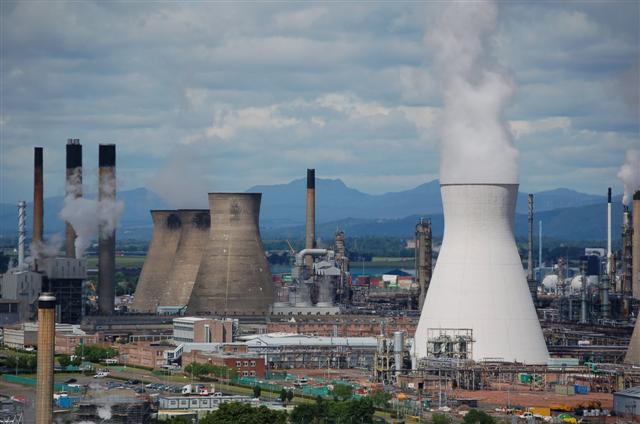
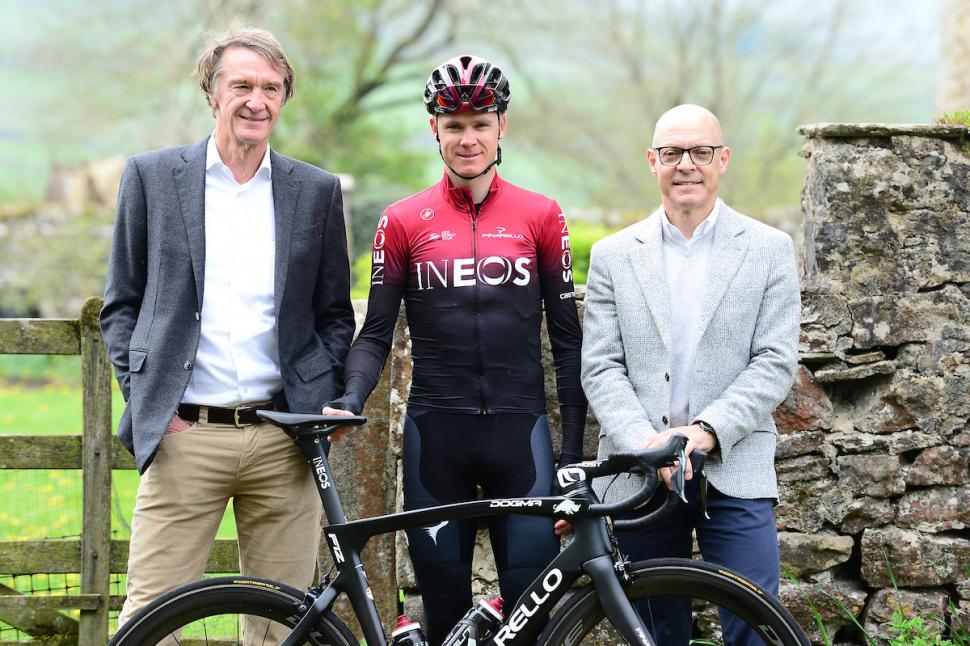

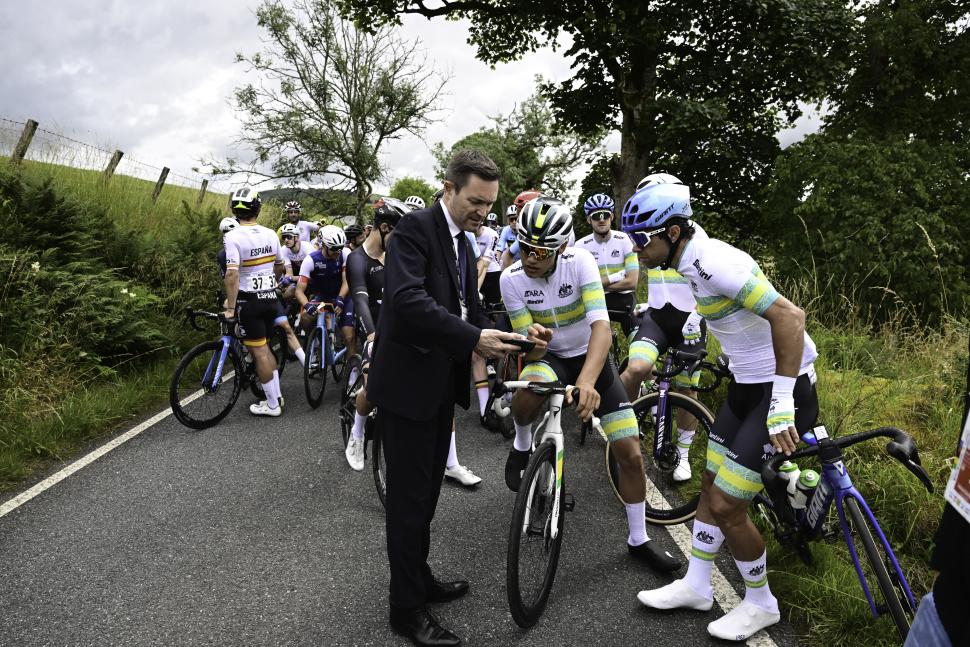

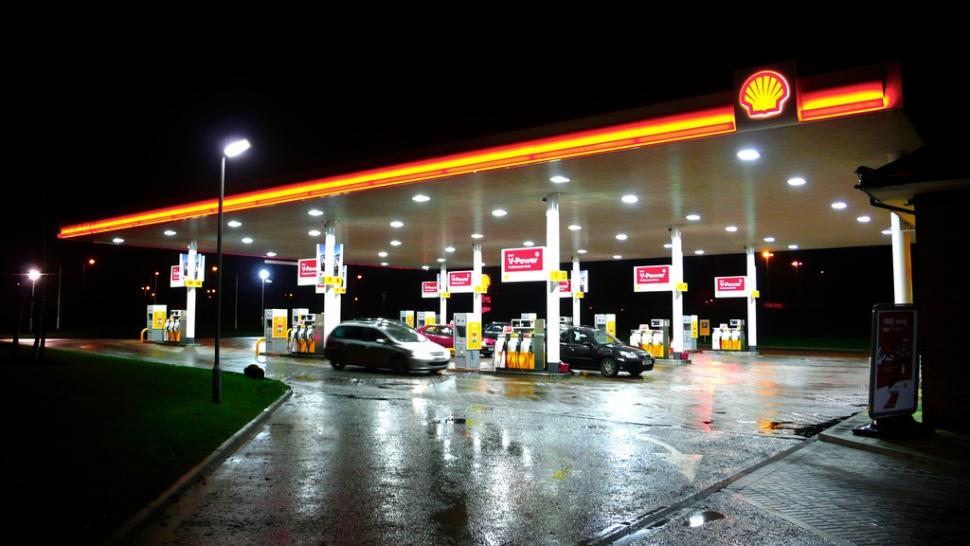

Add new comment
70 comments
They often took direct, violent action. https://en.wikipedia.org/wiki/Suffragette_bombing_and_arson_campaign
I'll repeat what I've said before - how people protest isn't that important and there'll always be people complaining that they're not protesting in the "correct" way. What's important is that people feel the need to protest and what they're protesting about.
You have a vote (presumably), use it how you wish. If you care deeply enough about the environment to want Greens rather than the Tories/Sir Softie aka The Pointless Human Bollard, then use your vote to reflect your feelings.
I've just written a stern (but polite) letter to the gas board
That's a coincidence - I have too!
Cue Pamela Stephenson as Esther Rantzen...
There is a common assumption that the UK government haven't done much about climate change.
If you dig into the systemic changes that have taken place over the last decade, largely behind the scenes and unnoticed, you can see that huge strides have been made.
This has happened without a huge amount of political fanfare and with broad political support.
https://grid.iamkate.com is a really good resource for looking at UK electricity emissions as an example. The change over the last decade has been absolutely enormous. That hasn't happened by accident.
That's the point. Decarbonising the grid has been politically simple and the punters don't much care since the same stuff comes out of the sockets.
What's next is much harder because it requires people to make changes in how they live (travel, heating their homes, etc.). We're all in favour in principle - but many will vote against in practice (because China! Cost! Freedom! Whatever...).
All the ranting about "the government should do more" is largely misplaced: they'll do what they think will get us to vote for them. Lots of people will vote for greener policies - so long as they aren't inconvenienced or required to change their habits. Which is exactly what needs to be done.
Whilst the UK has become more efficient in energy usage, a large part of the "decarbonising" has been by moving emissions to other countries.
I think it's a bit simplistic to thing that governments will just do what they think will get us to vote for them as their doners and supporters have a vast influence. Also, the voters can often be fooled by narratives in mainstream media and thus not vote in their own best interest (or indeed the best interests of the population).
As an example, surely most people would consider that clean air is extremely fundamental and would not vote for politicians that wish to remove air quality regulations, and yet we have this: https://www.theguardian.com/environment/2023/aug/04/uk-government-ignoring-green-watchdog-over-air-quality-rules
Of course voter opinion isn't the only thing that governments take heed of - but it is what gets them into power. Without that they're not implementing any policies.
And of course how people vote is influenced by such as the media amongst other things. But that's the point - a nation whose favourite reads are The Sun and the Daily Mail is hard to convince to vote for deep green policies. As J.C. Juncker said on this topic, "We all know what to do, but we don't know how to get re-elected once we have done it." He might have added that he probably wouldn't have been elected in the first place if he'd said he was going to do what needed to be done (a lesson Starmer seems to have drawn).
I wonder if the protesters looked at the nearby wind turbines in the glen not one was moving and with hardly any sun I doubt if much electricity was produced by solar panels, what are we suppose to do, the main problem in the world is to many people now. Maybe another world war to trim us down might help.
Pages